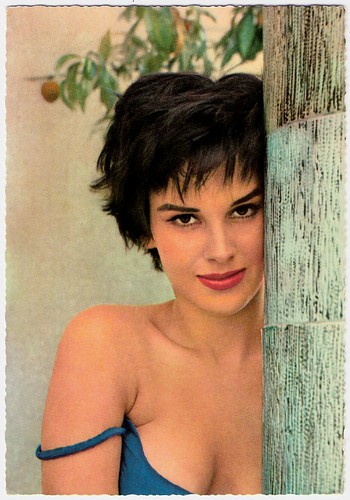
German postcard by Krüger/Ufa, no. 902/151. Photo: Fried Agency.
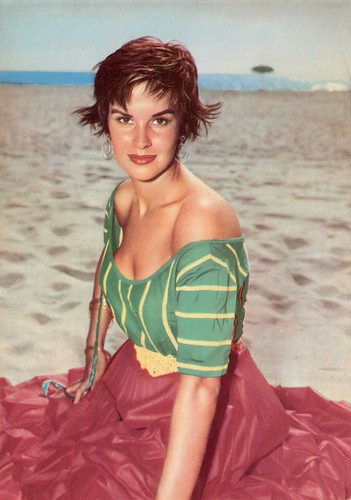
French postcard by Editions P.I., Paris (French licency holder for Ufa, Berlin-Tempelhof), no. CK-159. Photo: Herbert Fried / Ufa.
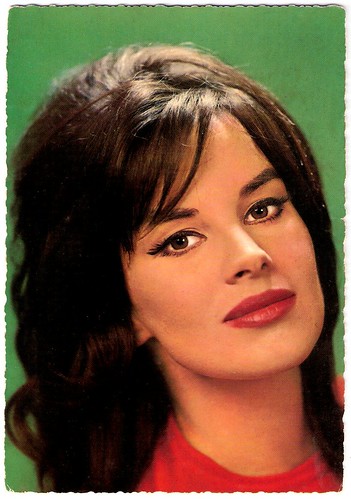
German postcard by Krüger, no. 902/111. Photo: Farabola.
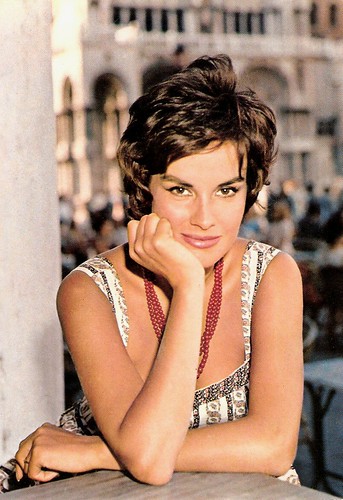
Italian postcard by Rotalfoto, Milano (Milan), no. 62.
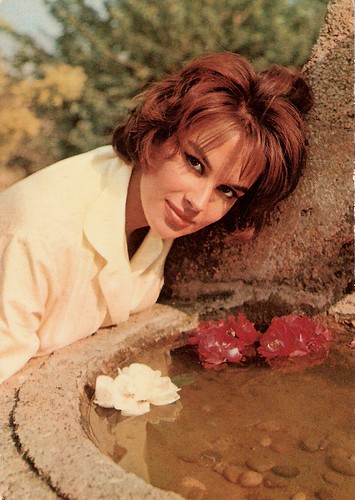
French postcard by Editions P.I., Paris, no. 1032. Photo: Beauvarlet / D. Roger.
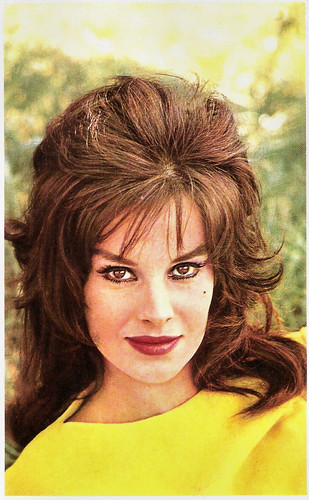
French postcard by Editions P.I., Paris, offered by Corvisart, no. 1072. Photo: Noa.
Franco Interlenghi
Antonella Lualdi was born as Antonietta De Pascale in Beirut, Lebanon in 1931. She was the daughter of an Italian civil engineer and his Greek wife. She learned to speak Italian, French, Greek and a bit of Arabic. With her mother, her sister and her two brothers, Antonella went to live in Rome. At 17, she made her film debut in the musical Signorinella (Mario Mattoli, 1949).
That same year, she appeared in Canzoni per le strade/Songs for the Road (Mario Landi, 1949). Immediately she was seen as a star of the same stature as Lucia Bosé and Gina Lollobrigida.
In the early 1950,s she appeared successfully in films like Ha fatto 13 (Carlo Manzoni, 1951), E Più Facile Che Un Camello/It is Easier for a Camel (Luigi Zampa, 1951) with Jean Gabin, La cieca di Sorrento/The Blind Woman from Sorrento (Giacomo Gentilomo, 1952), the comedy È arrivato l'accordatore/The Piano Tuner Has Arrived (Duilio Coletti, 1952), and Il cappotto/The Overcoat (Alberto Lattuada, 1952) - an adaptation of the classic Nicolas Gogol fable.
During the shooting of I Vitelloni (Federico Fellini, 1953), she met her future husband, Franco Interlenghi. Together they starred in several productions like Non c'è amore più grande (Giorgio Bianchi, 1955), Gli innamorati/Wild Love (Mauro Bolognini, 1955), which was feted at the 1956 Cannes Film Festival, and Padri e figli/Fathers and Sons (Mario Monicelli, 1957).
Without her husband, she appeared opposite Marcello Mastroianni in the controversial Cronache di poveri amanti/Chronicle of Poor Lovers (Carlo Lizzani, 1954), La notte brava/The Big Night (Mauro Bolognini, 1959), I delfini/The Dauphins (Francesco Maselli, 1960) starring Claudia Cardinale, and Il disordine/Disorder (Franco Brusati, 1962) with Alida Valli.
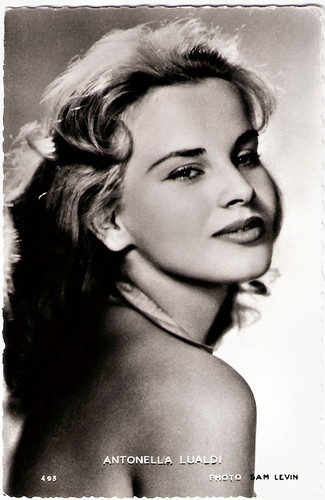
French postcard by Editions P.I., Paris, no. 493. Photo: Sam Lévin.
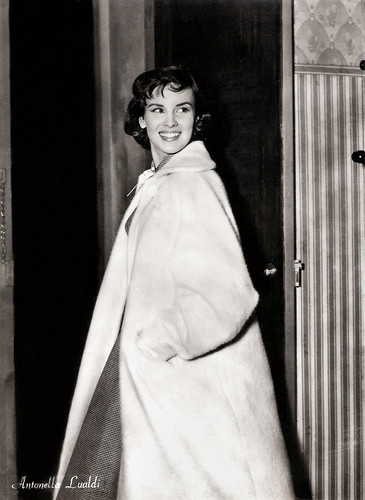
Big Italian postcard by Bromofoto, Milano.

Italian postcard by Bromofoto, Milano, no. 1234. Photo: Italy's News Photos. With Franco Interlenghi.
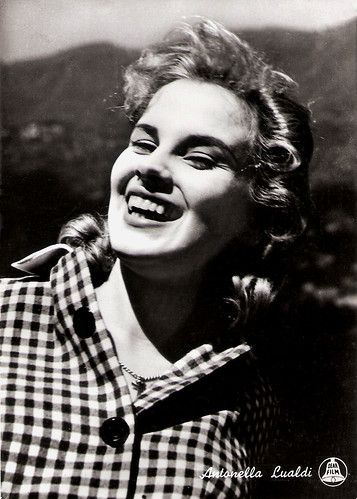
Italian postcard by Bromofoto, no. 550. Photo: Dear Film.

Italian postcard by Casa Editr. Ballerini & Fratini, Firenze. Photo: DEAR Film. Antonella Lualdi in Perdonami!/Forgive me! (Mario Costa, 1953).
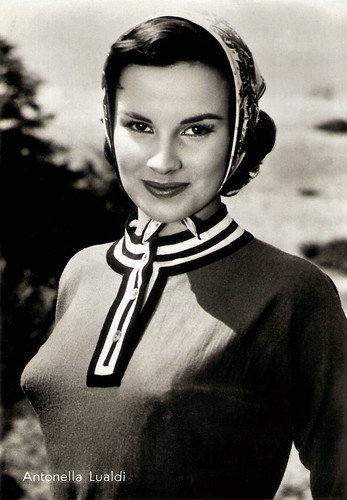
Italian postcard by Bromostampa, no. 6.
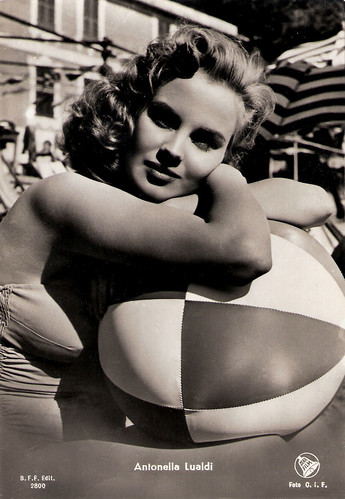
Italian postcard by B.F.F. Edit., no. 2800. Photo: Dear Film / C.I.F.
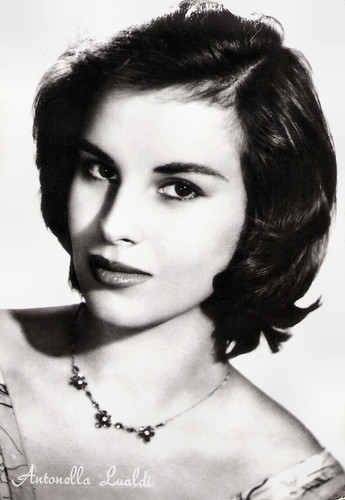
Yugoslavian postcard by NPO, no. G21.
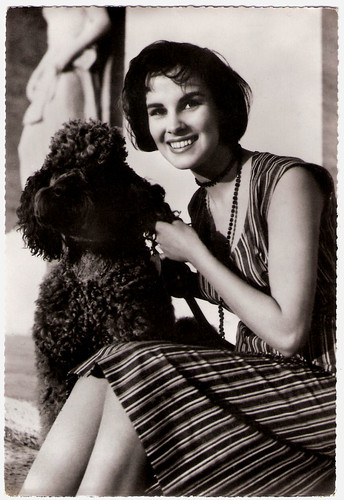
Yugoslavian postcard by 3K, no. 3840.
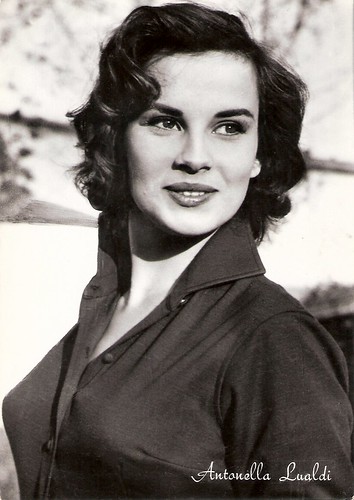
Italian postcard by Rotalfoto, no. 539.
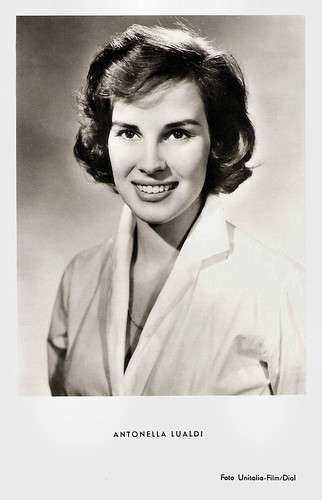
West-German postcard by Kunst und Bild, Berlin, no. A 1155. Photo: Unitalia-Film / Dial.
Arthouse and Sword and Sandal epics
Antonella Lualdi appeared also in many French films, including Adorable créatures (Christian-Jaque, 1952) with Daniel Gélin, the successful Stendhal adaptation Le Rouge et le Noir/The Red and the Black (Claude Autant-Lara, 1954) starring Gérard Philipe, the Film-Noir Mefiez-Vous Fillettes/Look Out Girls (Yves Allégret, 1957), Une Vie/A Life (Alexandre Astruc, 1958) based on a novel by Guy De Maupassant, and Á Double Tour/Web of Passion (1959), a tale of murder and a dysfunctional family by Nouvelle Vague director Claude Chabrol.
In the 1960s she was seen in arthouse productions like Se permettete parliamo di donne/Let's Talk About Women (Ettore Scola, 1964) with Vittorio Gassman, Comizi d'amore (Pier Paolo Pasolini, 1965), and Made in Italy (Nanni Loy, 1965).
But she also starred in Sword and Sandal epics like Arrivano i Titani/The Titans (Duccio Tessari, 1961), I cento cavalieri/Hundred Horsemen (Vittorio Cottafavi, 1964), and Columna/The Column (Mircea Dragan, 1968) with Richard Johnson and the legendary Amedeo Nazzari.
From the 1970s on, her films were less interesting with the exception of Vincent, François, Paul et les Autres/Vincent, Francois, Paul and the Others (Claude Sautet, 1974). For a while, she worked as an assistant director.
In 1992 she made a comeback on TV as Lucia Cordier, the wife of the protagonist (Pierre Mondy) of the crime series Les Cordier, juge et flic, which was broadcasted for 13 seasons till 2005. Her role was continued in the series Commissaire Cordier (2005-2008). Antonella Lualdi and Franco Interlenghi separated in 1972 but later came back together. Interlenghi passed away in 2015. They had two daughters, Stella Interlenghi and actress Antonella Interlenghi.

Italian postcard by Casa Editr. Ballerini & Fratini, Firenze, no. 3154. Photo: Dear Film.
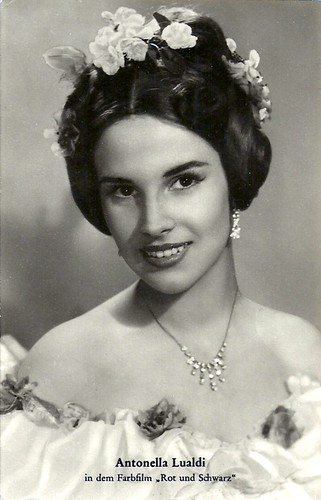
East-German postcard by VEB Progress Filmvertrieb, Berlin. Photo: Antonella Lualdi in Le rouge et le noir (Claude Autant-Lara, 1954).
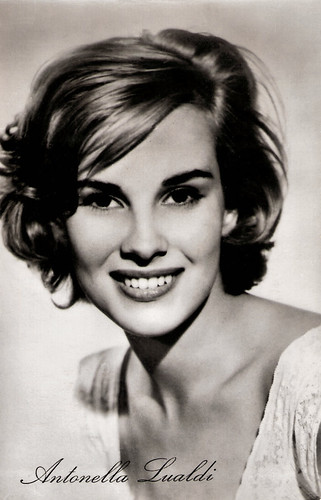
East-German postcard by VEB Progress Film-Vertrieb, no. 836, 1959.
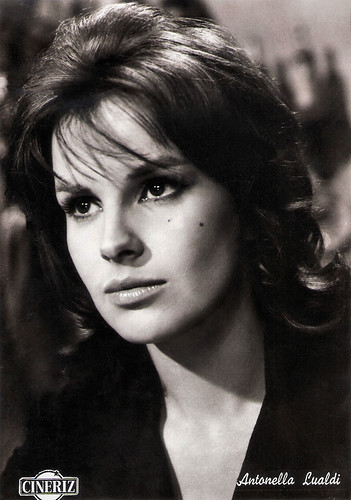
Italian postcard by Bromofoto, Milano, no. 1736. Photo: Cineriz. Publicity still for Via Margutta/Run with the Devil (Mario Camerini, 1960).
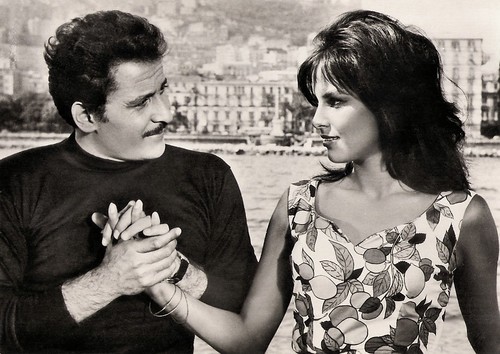
East-German postcard by VEB Progress Filmvertrieb, Berlin. Photo: Antonella Lualdi and Domenico Modugno in Appuntamento a Ischia (Mario Mattoli, 1960).
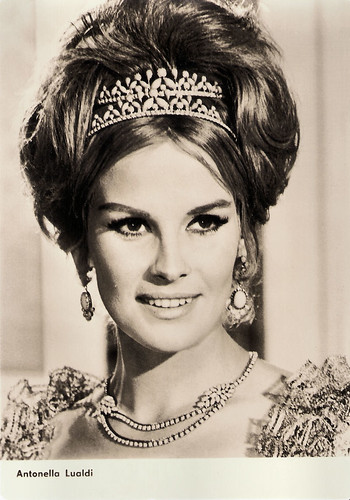
East-German postcard by VEB Progress Film-Vertrieb, Berlin, no. 2815, 1967. Photo: publicity still for Surcouf, l'eroe dei sette mari/The Sea Pirate (Sergio Bergonzelli, Roy Rowland, 1966).
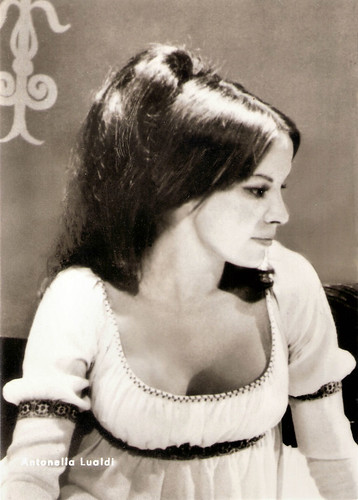
East-German postcard by VEB Progress Film-Vertrieb, Berlin, no. 248/70. Photo: publicity still for Columna/Trajan's Column (Mircea Dragan, 1968).
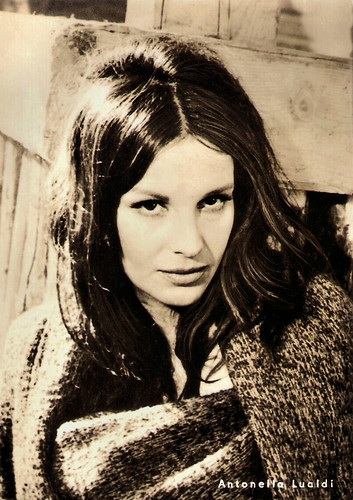
East-German postcard by VEB Progress Film-Vertrieb, no. 20/71. Photo: publicity still for Columna/The Column (Mircea Dragan, 1968).
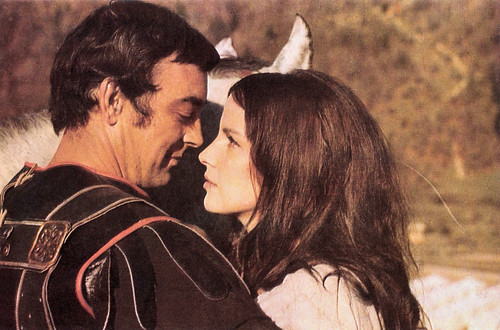
Romanian postcard by Casa Filmului Acin, no. 92. Photo: publicity still for Columna/Trajan's Column (Mircea Dragan, 1968) with Richard Johnson.

French postcard in the series 'Les Cordier, juge et flic - Le collection officielle' by U.M.K. Collections, 2004. Photo: Corbis. Publicity still for Les Cordier, juge et flic/The Cordiers, Judge and Cop (1992-2005) with Antonella Lualdi as Lucia Cordier.
Sources: Sandra Brennan (AllMovie), Notre Cinema (French), Wikipedia, and IMDb.
6 comments:
She is very beautiful, with an arresting quality not often seen.
Happy PFF!
Great cards and the story to go with them, but I've never heard of her. Ever. How quickly we collectively forget!
Amazingly, on the whole her pictures don't seem dated at all. Her look is very modern apart from just one or two.
What a piquant face--such a lovely lady. Thank you for joining us! It's good to see you back, Bob of Holland! (grin) I enjoyed reading all about this beautiful lady.
Happy PFF!
She was a favorite of an uncle who seldom missed an opportunity to see her films when they played in a local theater known for "arthouse showings."
Must have been a great uncle!
Post a Comment